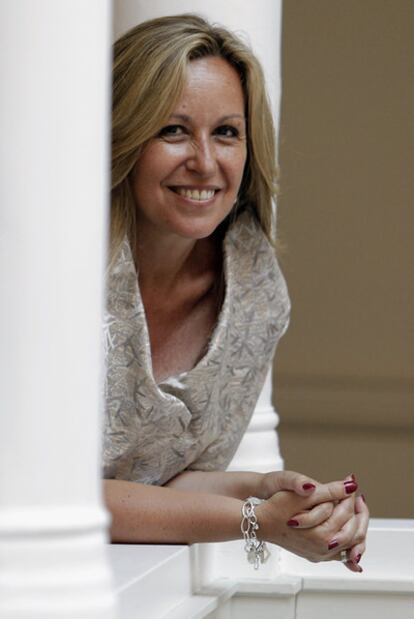Israel fumes over foreign minister's Palestine position
Trinidad Jiménez told EL PAÍS that EU now has "level of maturity" to recognize two states
Israel on Monday reacted angrily to comments made by Foreign Minister Trinidad Jiménez in favor of the recognition of Palestine. The chief of the European section of Israel's Foreign Ministry summoned Spanish Ambassador Álvaro Iranzo to relay his displeasure. Israel's deputy foreign minister, Daniel Ayalon, is due in Madrid on Wednesday and will meet with his counterpart, Juan Antonio Yáñez, to "explain Israel's position on the Palestinian initiative."
On September 2, EU foreign ministers will meet in Sopot, Poland to discuss, among other issues, the Syrian crisis and the war in Libya. The thorniest matter on the table, however, is likely to be the recognition of the state of Palestine, which is up for vote in both the UN's Security Council and General Assembly in September. The EU's 27 foreign ministers are still heavily divided on the subject, and Jiménez aims to broker an agreement in the Sopot meeting in which a majority of Europe's foreign ministers support "moving forward with the recognition of the state of Palestine."
On the other hand, Spain's foreign minister told EL PAÍS in an interview conducted last week that a failure to give a sign could generate "a great deal of frustration among the Palestinian people." What follows is a translation of the interview published in Spanish on Sunday:
Question. The UN Assembly will vote on whether to recognize Palestine or not in September. You are pushing for a consensus among your European counterparts before this. How do you plan to achieve this?
Answer. We are working with the idea that there is a majority in the EU that will support moving forward with the recognition of Palestine. Even Israel accepts the existence of two states. This is a goal we have been seeking for years, and I believe that there is a level of maturity now to take a step in that direction. There is a feeling that now is the moment to act, to give the Palestinians some hope that their state will become a reality. We know it is a very prolonged conflict and difficult to resolve in just a few months, but this is a crucial moment. We need to send a sign, because if not, it could generate a great deal of frustration among the Palestinian people. They, too, want to form part of the hopes for democracy and freedom that exist in the rest of the Arab world.
Q. Can Israel be convinced that recognition of Palestine is not a hostile act?
A. Appealing to the United Nations cannot be a hostile act against anyone. It is the organization that most widely and legitimately represents all of us. I truly believe that when the Palestinian National Authority started going down this path, it felt it was the best way to ensure peace.
Q. Do you believe that Al-Assad's resignation is in Syria's future?
A. The position that Bashar al-Assad has taken is unacceptable: the systematic repression of citizens who are peacefully seeking their freedom, using tanks in cities, massive arrests... Even so, the international community has restrained their condemnation in order to give him options.
Q. Spain has been one of the most reluctant to condemn.
A. No, Spain has always upheld the general EU consensus. And in fact, we have tended to lean more heavily toward condemnation. Al-Assad has gone so far that there is no turning back for him. He has lost all credibility.
Q. Would Spain be willing to provide asylum to the Al-Assad family?
A. This is not something that we have discussed. What is important to me is that the repression stops and a national dialogue is opened that guarantees free and peaceful coexistence.
Q. Italy has withdrawn its ambassador from Damascus, as has Saudi Arabia and other countries in the Gulf, but Spain has not yet done so.
A. Our ambassadors have to keep providing us with information, maintaining pressure and protecting our citizens. There are more than 1,000 Spanish citizens in Syria. So, while our diplomatic representation continues to be useful, we are in favor of keeping them there, although we are willing to open this to debate in the EU.
Q. The military intervention in Libya began in March and was supposed to last a month. It has now been five months, and Gaddafi is still in power.
A. The situation was too complex to be resolved in just a month. But I believe that progress has been made. It is just a question of time before Gaddafi's regime falls.
Q. Will Gaddafi's frozen assets in Spain be used to finance the National Transition Council?
A. We have begun the paperwork with the Economy Ministry to see which is the best way to go about it, but the government is willing to do so, within legal limits.

Tu suscripción se está usando en otro dispositivo
¿Quieres añadir otro usuario a tu suscripción?
Si continúas leyendo en este dispositivo, no se podrá leer en el otro.
FlechaTu suscripción se está usando en otro dispositivo y solo puedes acceder a EL PAÍS desde un dispositivo a la vez.
Si quieres compartir tu cuenta, cambia tu suscripción a la modalidad Premium, así podrás añadir otro usuario. Cada uno accederá con su propia cuenta de email, lo que os permitirá personalizar vuestra experiencia en EL PAÍS.
¿Tienes una suscripción de empresa? Accede aquí para contratar más cuentas.
En el caso de no saber quién está usando tu cuenta, te recomendamos cambiar tu contraseña aquí.
Si decides continuar compartiendo tu cuenta, este mensaje se mostrará en tu dispositivo y en el de la otra persona que está usando tu cuenta de forma indefinida, afectando a tu experiencia de lectura. Puedes consultar aquí los términos y condiciones de la suscripción digital.








































